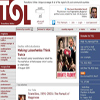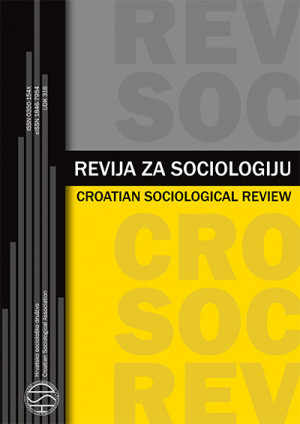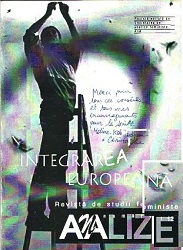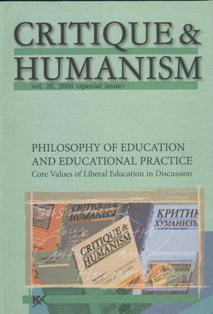
The Sin of Sins
Empathy for the plight of women alcoholics in Russia is rising far more slowly than their numbers.
More...We kindly inform you that, as long as the subject affiliation of our 300.000+ articles is in progress, you might get unsufficient or no results on your third level or second level search. In this case, please broaden your search criteria.

Empathy for the plight of women alcoholics in Russia is rising far more slowly than their numbers.
More...
The main question raised in the paper is whether the social consequences of the “transition to capitalism” (increased social and economic stratification, the absence of a social consensus on desirable social values, etc.) has had an impact on the modernization-related lag of Croatian society at value level. In an attempt to find an answer to this question, the authors investigated the compatibility of value orientations of secondary school pupils socialised during the transition period in Croatia with value types typical for the Inglehart model of value modernization, including the differences related to gender and the regional developmental level. The investigation of value orientations was carried out on a representative, stratified sample of 3471 pupils from two Croatian counties (Lika-Senj and Primorje-Gorski Kotar). The hierarchy of the tested values and their factorial structure were examined, followed by an investigation of specific regional and gender-related differences using two-way analysis of variance. The results show that pupils socialised in the transition period in Croatia accept a wide range of value orientations, which supports the hypothesis that modernization processes in this period have taken place on several qualitative levels. Testing of the significance of the differences between various sub-groups (region x gender) showed that developmental factors affect the transformation of value-related attitudes of youth, but also that the culturally mediated effect of gender relativises the impact of developmental factors. The authors ascribe this situation to the permanent relevance of gender divisions in the society, which have not decreased in importance even under the circumstances of modern social changes.
More...
The last Eurobarometer survey carried out by the EU in candidate States shows that Romanians are strong supporters of European integration, although only one Romanian in three believes he or she is well-informed about the accession process.
More...

The diferences between our country and European Union are not only economical. The Romanian people are not only poor, but they live a "short and not healthy life". Les différences entre notre pays et l’Union Européenne ne relèvent pas uniquement du côté économique. Les Roumains sont non seulement plus pauvres, mais leurs vies sont plus courtes et moins saines. En Roumanie, la plupart des femmes, malgré le droit qu’elles ont d’être correctement informées, n’ont pas les moindres notions sur ce qui veut dire mener une vie saine et à l’abri des risques. La législation dans ce sens ne leur est pas favorable non plus. En ce qui suit, je vais essayer, sans aucune prétention d’épuiser le sujet, de mettre en évidence quelques aspects à améliorer dans le domaine de la santé de la reproduction, qui concernent notamment les femmes. Ne pas les résoudre ou tarder à les résoudre pourrait avoir de graves conséquences, autant sur l’état de santé de la population que sur notre crédibilité pour ce qui est des négociations concernant l’intégration.
More...
For almost fifty years, the European Union, and the European Economic Community, which preceded it up to 1993, has been developing a policy of equal opportunities for men and women. This does not mean that women's problems have been solved or that this process knew a steady dynamics; the more so one couldn't possibly maintain that the measures adopted are fully satisfactory for women in the member countries or that men assented to them. Cet article présente, par ordre chronologique, les éléments les plus importants de ces politiques, insistant sur la législation et les documents les plus importants pour la compréhension de leur statut actuel. Le cas de la Belgique est proposé en guise d’exemple, pour mieux faire comprendre comment un Etat membre adopte la législation européenne et comment il promeut au niveau national ses propres initiatives.
More...
The fragment is a part of an autobiographical volume written with Micrea Miclea. The text is the reply to a reproach from Mircea regarding the "black face" of my stories under the title "the year 1989". Looking for something that was't black, I found the "so and so".
More...
In December 1999, the European Union published the report "European Union Support for Roma communities in central and eastern Europe". According to this Report, over 12 milion Roma live in the world now. In Europe, their number reaches at least eight milion, of whom six ,milion live in Central and Eastern Europe. Des groupes minoritaires existent à l’intérieur même des minorités. En ce qui suit, je vais m’occuper spécialement des femmes appartenant à l’ethnie des Roms qui, dans le contexte de la persistance d’un modèle familial traditionnel, sont subordonnées à leurs maris et ont des droits extrêmement limités, dans toutes les sociétés de l’Europe Centrale et de l’Est. Les problèmes des femmes romes n’apparaissent pas explicitement formulés dans les documents élaborés par l’Union Européenne et encore moins dans les documents de réponse relatifs aux stratégies d’intégration sociale des Roms dans les pays candidats à l’intégration. Elucider la création de cette situation et identifier ses causes, officiellement reconnues, mais aussi les causes non reconnues, avec leurs dimensions qualitatives et quantitatives, ce sont les deux volets de cet article. J’ai analysé tour à tour l’intérêt de l’Union Européenne par rapport à la minorité des Roms, en termes de programmes et d’allocations destinées à ces programmes, et les recommandations que l’Union Européenne a reçues dans ce sens. Ensuite, ces recommandations ont été discutées dans une perspective comparative par rapport aux recommandations adressées à la Roumanie par la Commission Européenne, à l’occasion des rapports nationaux de 2000 et de 2001. Tout cet aller-retour des théories et des idéologies à la pratique a été régi par un intérêt spécial porté à la problématique
More...
There is no context in which security might be separated from problems related to the unleashing of war and, implicitly, from the propensities toward war of various categories of people involved either in decision-making processes, or in receiving, accepting and implementing such decisions. The author writes: Je me propose de présenter quelques aspects relatifs à la recomposition contemporaine des mécanismes de sécurité européenne, à partir de la dimension du contrôle démocratique. Mon argumentation va dans le sens d’une augmentation de ce contrôle dans le cas des organismes créés après les réunions de Helsinki (1999) et Nice (2000), compte tenu notamment de la masculinisation toujours plus grande de ces institutions, tout comme de leurs relations très faibles avec les institutions représentatives nationales et supranationales. D’après moi, la perspective et l’action de genre sont déterminantes pour regagner le contrôle démocratique des organismes européens chargés de la politique étrangère, de la sécurité et de la défense communes.
More...
The purpose of this article is to present some important problems on the teme of "gender equity" on labor market. At first a presentation of the legal enviroment on labor market and the agrements on international, national and europeean level, diferences and paralelism between romanian and europeen legislation. Second an analyses on the social grups profile for those who can benefit on the gender equity issue not only on the labor market. L’objectif de cet article est de présenter quelques problèmes importants relevant du thème général de “l’égalité de genre” sur le lieu de travail. L’argumentation est structurée en deux parties: Premièrement, une présentation des réglementations légales du domaine du travail et des accords conclus au niveau international, européen et national, avec une insistance sur les similitudes et les différences entre les législations roumaine et européenne. Secondement, une analyse portant sur le profil des groupes sociaux auxquels pourraient s’adresser une stratégie sociale concernant l’égalité de genre – non seulement au niveau du travail. Selon les données quantitatives, une stratégie visant à consolider les droits des femmes dans la société devrait s’adresser notamment aux personnes de sexe féminin ayant une formation universitaire, vivant en Transylvanie ou à Bucarest, qui sont au courant des problèmes des femmes et, qui, en plus, sont activement impliquées dans les débats et les stratégies liées à la place des femmes dans la société roumaine.
More...
We are living a reality we got used to perceive and, implicitly, represent in a bipolar way. Meanings attached to things, behaviors, attitudes, roles, institutions are inflexibly and invariably tributary to duality. Going beyond the Saussurian conception of language as a system of mutually defining entities, I'll try to anchor the survey of the European integration process, at Romania's population level, within the theoretical framework created by the french analyst Helene Cixous. Mon approche des représentations collectives de l’Union Européenne se situe dans le cadre théorique élaboré par la féministe française Hélène Cixous et prend comme appui les données statistiques fournies par le “Baromètre de genre” publié en mai 2001. Selon Cixous, l’opposition binaire qui gouverne notre pensée a été culturellement et historiquement structurée par l’opposition entre masculin et féminin. Tributaire à cette grille de pensée, la grande majorité des Roumains considèrent l’intégration européenne uniquement comme une opportunité heureuse pour obtenir un meilleur niveau de vie, glissant, par là, dans la catégorie de féminité telle que l’a définie Cixous. Par conséquent, “le Roumain générique” se définit soi-même comme sujet d’une connaissance émotionnelle, occupant une position dépendante. Cette situation de l’agent épistémique dans un périmètre de la féminité et de la dépendance conduit à la formation d’une représentation de l’Union Européenne comme “sauveur” et “bienfaiteur”, représentation de la masculinité. La dépendance du pôle faible par rapport à un pôle fort et la subordination du premier, la féminité, à l’ordre imposé par le second, la masculinité, conduit à la représentation d’une autre identité de l’Union Européenne, opposée à la première, à savoir l’Union Européenne comme “oppresseur”. Pour une partie des personnes ayant répondu aux sondages, une Roumanie intégrée, c’est une Roumanie qui aurait perdu son indépendance et son identité nationale.
More...
In the present study, the author approaches a sensitive subject linked to the pre-modern and modern feminine imaginary, the women's position in a changing society, a society full of hopes and illusions in the process of modernization and europenization, a society that assimilated just a pseudo-refinement of Oriental - Fanar origin rooted in an local fond that immitates the modernity in a superficial and grotesque way.
More...
Author deals with the fact of gender misrepresenting in media - Czech TV, newspapers and amongst Czech intellectual community and argues for establishing of real women politics - gynopolitics. Even then new discourse on women´s and gender issues can be established.
More...
Gender studies have lately paid special attention to the oscillating condition of masculinity in an ever-changing society (see Shira Tarrant, Men Speak Out, 2008). As these aspects were taken into consideration especially in the United States, a very good representation of this straggling sexuality is to be found in Ken Kesey’s novel One Flew over the Cuckoo’s Nest. Oppressing the mental opposition to the Establishment by harming the integrity of the body is Kesey’s topic obsession. His hero, the machoistic Randle McMurphy, confronts with nurse Ratched who, in spite of her poignant female attributes, escapes every sexual connotation and calls her patients to reason and social conformity on behalf of what the Indian narrator denominates The Combine. Who doesn’t comply with her predicaments has to suffer electroshock therapy and even lobotomy. This is the blueprint of a conflict in terms of matriarchate being assaulted by the manhood of the asylum residents. More than this, the exploitation of the theme of disobedience in a consumerist, clerkish society is a theme which will know further developments in Susan Kaysen’s Girl, Interrupted and James Bailey’s Man, Interrupted. The result will be a branched culture that is the culture of the social healers and the one of their patients. Interconnectivity keeps being scarce, but at a closer look we perceive the real conflict for power, irrespective of sex or even gender attributes. In the politicized asylums sex is not something to be pushed towards a cultural gender, but something that has to be eradicated.
More...
Starting from the premise that the gender perspective is one of the paradigms that could be helpful in interpreting social processes in socialism and the subsequent transition period, this analysis uses the term gender as a useful category in historical analysis. The study is therefore focused on the post 1989 situation of communities artificially swollen by the socialist forced industrialization, with a special eye for the situation of women. The study uses a practice-based approach in describing the everyday life (work, family, feasts, etc.) of the community, and women’s status, work, gender relations (womenwomen, and women-men relations) within the community. The aim of the study is to interpret social change as historical process, as transformation within which there is a relation between social practice and social structure. The essay describes the conceptual framework of gender, listing those disciplines, and theoretical positions, in which one can situate the terminology of this research in relation with the conceptual apparatuses of these disciplines. This is followed by a section on methodology describing the methods used and the problems encountered during the research. The essay ends with the presentation of the case studied. The aim of the study is to concentrate on the history of social change produced by the interaction of social practice and social structure and on outlining and understanding some problems of the current situation with special emphasis on women and work.
More...
Higher education system in Serbia has for over a hundred years had representatives in claiming the most prestigious academic titles and acknowledgments among women, thus opening up the perspective of gender equality. However, with the exception of real socialsism, this potential had to date litttle or no effect on the parameters of gender equality or even gender awareness of the mainstream higher education system or the general population. To illustrate this the authors point to the data concerning the higher education system as well as to the example of that the establishing of women‘s and gender studies in Serbia has meant.
More...
The research presented here is a part of an ongoing and a more extensive project to gather data and analyze the status of gender equality within educational system in Serbia. This part of the research is concerned with attitudes toward gender equality within the higher education system and as a point of departure uses an assumption that higher education has in establishing value systems far reaching consequences for the whole society and its future. The research is based on questionnaires through which the following data has been gathered: attitudes to motivation for the choice of field of study and profession; roles in the family; partner roles; feminism. The conclusions point to the fact that the gender roles are not too rigid and stereotypical but point out to some attitudes that need to be further explored, namely young men appear to be less conservative than young women.
More...
Nancy Fraser gave this interview for the forthcoming special issue of Critique and Humanism journal focused on gender studies developments and edited by Marina Liakova and Viara Angelova. The issue is presenting the debates on the social construction of gender currently ongoing in the fi elds of humanities. It is publishing special contributions by authors from Bulgaria, Germany, Norway, USA, etc. The papers deal with the inequality issues of the sexual minorities in differing social and historical contexts. The problems of scrutiny regard the political and economic inclusion of the sexually different, their marginalization at the labour market their juridical differentiation and so on. The issue is detecting the novel developments in the gender theories and remains open for contributions until October 30th, 2008.
More...